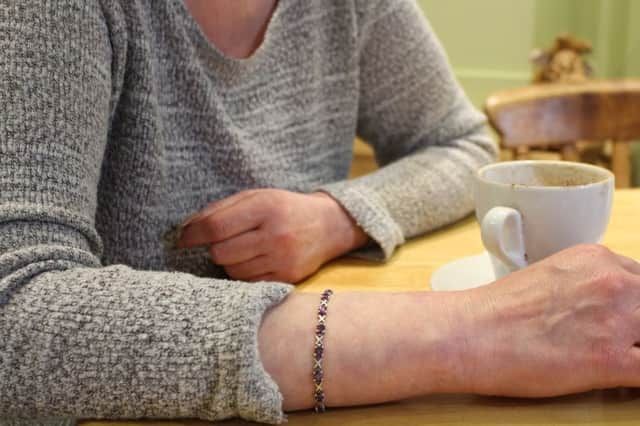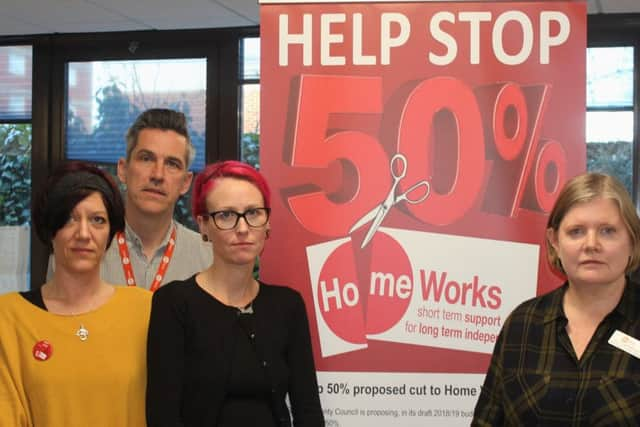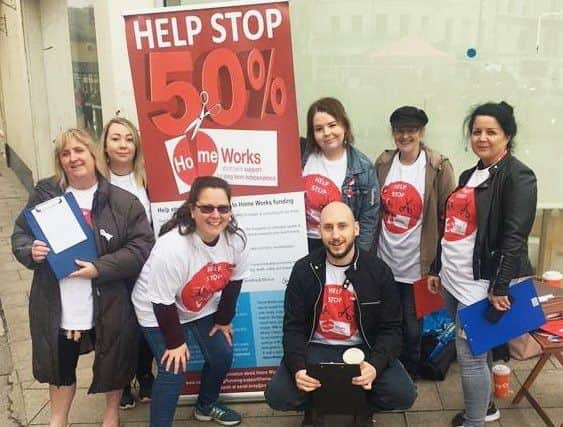How Home Works is helping support insecurely housed people in our town


The stereotypical representation, and one we all no doubt conjure in our minds initially, is of a rough sleeper, unkempt and unclean, poor, and unemployed. There may also be connotations of crime, substance misuse, mental health issues – generally people sidelined by society.
But the reality is, homelessness can happen to any one of us. A relationship breakdown, the loss of a job, an illness – these are just three of the common triggers that lead to people losing the roof over their heads, and when they least expected it.
Advertisement
Hide AdAdvertisement
Hide AdI spent the day shadowing two floating support officers at Home Works, which is a service providing short-term, homelessness prevention support for vulnerable people and their families in the area.


In just one day, I saw people from a range of backgrounds and circumstances but all with one thing in common – their housing situation was unstable and uncertain.
There was a family being evicted as their landlord wanted to sell the property; a young woman in temporary accommodation after losing her job; a man sleeping rough after being released from prison; and a woman whose house is not suitable for her needs after developing a chronic back condition.
These people are now counting on Home Works to stabilise their home situation.
So what exactly can Home Works do for these people?


Advertisement
Hide AdAdvertisement
Hide AdFor the family of seven facing eviction, officer Tracy Aston is desperately trying to help them find alternative accommodation, but that’s not as simple as it sounds.
The family, from Bexhill, is made up of two adults and five children – four sons and one daughter – and are facing imminent homelessness through no fault of their own.
The first port of call would be to see if the family can be put in temporary accommodation but, as Tracy explains, available houses are few and far between and even then, there are hardly any that would be big enough to house the client’s family. In a recent case, a family had to be put in temporary accommodation near Gatwick as it was the closest, available property with enough bedrooms.
For this family, moving out of the area would just not be possible, with the children attending local schools.
Advertisement
Hide AdAdvertisement
Hide AdSo Tracy turns to the private sector and works hard with her client to try and find a suitable property on the market. But again, this encounters many problems.
The client has pet dogs and the family receives Disability Living Allowance (DLA). Finding a private landlord that accepts one of these is tricky, but finding one that accepts both is a real tough ask.
But why are landlords so reluctant to accept DLA? As Tracy discusses with her client in frustration, it is a more reliable source of income than a wage from a job, which could be lost at any moment.
But despite this, and despite having a deposit and rent ready to go should a suitable property become available, the family are struggling to even secure a viewing, let alone a tenancy agreement.
Advertisement
Hide AdAdvertisement
Hide AdFor some, temporary accommodation is suitable – and a life-saving option.
The second client of the day is one of those. The young woman was leading, as she describes, a great life. She had a job abroad in the hospitality industry and after that, in the same sector here in 1066 Country. But in the blink of an eye, that all came crashing down and after losing her job, she found herself without a home. As a woman in her 30s, she became vulnerable, relying on strangers to ensure she didn’t end up spending the night on the streets.
And then she was referred to Home Works. The service arranged for her to be put in temporary accommodation and are helping her look to the future. Tracy, as her Home Works officer, is working with her client to find permanent accommodation and helping her enrol in a course that will stand her in good stead for a career in a new industry.
By her own admission, the client owes so much to Home Works, not only for putting a roof over her head but for their guidance and support, both technical and emotional.
Advertisement
Hide AdAdvertisement
Hide AdFor the afternoon, I shadowed fellow floating support officer Hayley Agutter. Every Thursday, Hayley represents Home Works at the Rough Sleepers Health and Housing hub, held at Seaview.
There, she meets potential new clients and offers support and advice to people who may be unfamiliar with the service, but who could benefit from its help.
A client we see on Friday is a man who Hayley met at the hub the day before. She undertakes an assessment to see if the client meets the criteria for Home Works’ help.
That criteria is someone aged between 16 and 64 and who is homeless or at risk of losing their home.
In this case, the client is eligible for help.
Advertisement
Hide AdAdvertisement
Hide AdHaving just been released from prison, the middle-aged man is rough sleeping as he has nowhere else to go, and is not able to contact his family living in another part of the country.
He has a number of health concerns, but is eager to get back on his feet and away from the streets, where he says illegal substances are more easily attainable and tempting.
At this early stage in Home Works’ contact with the client, Hayley sees which other services he has already engaged with, including the council, Seaview, East Sussex drug and alcohol recovery service (STAR) and a local GP.
The services work very closely with each other in Hastings and Rother, to ensure homeless people or those facing homelessness are fully supported in all aspects of their life, especially with issues which may contributing to an unstable housing situation, such as mental health issues or substance misuse.
Advertisement
Hide AdAdvertisement
Hide AdHayley arranges to meet the client again the following week so they can discuss the most appropriate way forward.
The final client of the day is living in a housing association property, but one that has become incredibly unsuitable after she developed a chronic back condition which severely reduces her mobility.
With the housing association apparently reluctant to adapt the property to suit her needs – which would require a ramp installed at the front door, a stair lift and a wet room – she is forced to continue living in a house that presents many barriers in everyday life.
Some days she has to sleep on the sofa as stairs are too much of a challenge, and she says she feels isolated as she struggles to even leave the property given the sizeable step down to the pavement outside her front door.
Advertisement
Hide AdAdvertisement
Hide AdThe lady, in her 30s, is on the Housing Register – in Band A – but with a mobility rating lower than it should be, she is unable to bid on properties that would be suited for her needs, such as bungalows or ground-floor flats.
Hayley, as her Home Works officer, is helping her client navigate through the necessary paperwork to increase her mobility rating to where it should be, so she stands a chance of securing a suitable property.
Alongside this, Hayley is supporting her client to ensure her Personal Independence Payments (PIP) are renewed, which again requires working through a whole host of forms and documentation.
In cases like this, Home Works’ support may not be as evident as taking a rough sleeper off the streets, but it is equally as important in ensuring vulnerable people in our community don’t become homeless. This, in turn, supports their physical and mental wellbeing, intervening before they find themselves in a truly terrible situation.
Advertisement
Hide AdAdvertisement
Hide AdAfter leaving this lady’s property, I ask Hayley what she thinks the key factors are to reducing homelessness in our area.
Her answer? More affordable housing, and less barriers for people trying to rent through the private sector.
This takes me back to the first clients I saw – the family who were facing eviction simply because their landlord wanted to sell the property.
This family are so far removed from the stereotypical view of homeless people, yet even they are finding it so difficult to rent a property, simply because they have pets – as so many families do – and because their income comes from a different source to what most landlords would like.
Advertisement
Hide AdAdvertisement
Hide AdWith so many boxes to tick, is it any surprise people are struggling to get by in the private sector?
All four of these cases highlight the huge importance of Home Works.
Recently, the service was faced with a 50 per cent cut to its funding. After a strong and emotional campaign, the cuts were reduced to 28 per cent.
While this may seem like a victory, it is a small one, for even a 28 per cent cut to a service this vital is bound to have repercussions.
Advertisement
Hide AdAdvertisement
Hide AdThe service’s floating support officers have seen their workload increase – previously, they would work with around 15 to 20 clients at one time, but now the number of people they work with are regularly around the 20 mark, and can even go up to 24 at one time.
This, inevitably, means the support and time they can give each client is reduced.
Despite this, they are out there helping so many people, from a broad range of situations and backgrounds.
Each case is tailored to support the personal needs of the individual, and support can be offered for as long or as little as the client needs.
For more information on Home Works, including how to access its support services, visit https://www.southdown.org/housing-support/home-works-east-sussex.